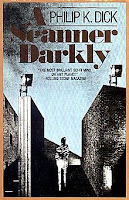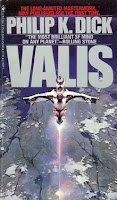Philip Kindred Dick (December 16, 1928 – March 2, 1982) was an American writer notable for publishing works of science fiction. Dick explored philosophical, social, and political themes in novels with plots dominated by monopolistic corporations, authoritarian governments, alternate universes, and altered states of consciousness. His work reflected his personal interest in metaphysics and theology, and often drew upon his life experiences in addressing the nature of reality, identity, drug abuse, schizophrenia, and transcendental experiences. Dick was married five times and had three children.
Born in Illinois before moving to California, Dick sold his first story in 1951, and from then on wrote full-time, although initially he found little commercial success. His 1962 alternate history novel The Man in the High Castle earned Dick early acclaim, including a Hugo Award for Best Novel. He followed with science fiction novels such as Do Androids Dream of Electric Sheep? (1968) and Ubik (1969). His 1974 novel Flow My Tears, the Policeman Said won the John W. Campbell Memorial Award for best novel.
Following a series of religious experiences in February–March 1974, Dick’s work engaged more explicitly with issues of theology, philosophy, and the nature of reality, as in such novels as A Scanner Darkly (1977) and VALIS (1981). A collection of his non-fiction writing on these themes was published posthumously as The Exegesis of Philip K. Dick (2011). He died in 1982 of a stroke, aged 53.
In addition to 44 published novels, Dick wrote approximately 121 short stories, most of which appeared in science fiction magazines during his lifetime. A variety of popular films based on his works have been produced, including Blade Runner (1982), Total Recall (1990), Minority Report (2002), A Scanner Darkly (2006), Paycheck (2003), Next (2007), and The Adjustment Bureau (2011).
In 2005, Time magazine named Ubik one of the hundred greatest English-language novels published since 1923. In 2007, Dick became the first science fiction writer to be included in The Library of America series.
Most entertain themselves using “Perky Pat” dolls and accessories manufactured by Earth-based “P.P. Layouts”. The company also secretly creates “Can-D”, an illegal but widely available hallucinogenic drug allowing the user to “translate” into Perky Pat (if the drug user is a woman) or Pat’s boyfriend, Walt (if the drug user is a man). This recreational use of Can-D allows colonists to experience a few minutes of an idealized life on Earth by participating in a collective hallucination.
Do Androids Dream of Electric Sheep? (1968) is the story of a bounty hunter policing the local android population. It occurs on a dying, poisoned Earth de-populated of almost all animals and all “successful” humans; the only remaining inhabitants of the planet are people with no prospects off-world. The 1968 novel is the literary source of the film Blade Runner (1982). It is both a conflation and an intensification of the pivotally Dickian question: What is real, what is fake? What crucial factor defines humanity as distinctly “alive”, versus those merely alive only in their outward appearance?
Ubik (1969) employs extensive psychic telepathy and a suspended state after death in creating a state of eroding reality. A group of psychics is sent to investigate a rival organisation, but several of them are apparently killed by a saboteur’s bomb. Much of the following novel flicks between a number of equally plausible realities; the “real” reality, a state of half-life and psychically manipulated realities. In 2005, Time magazine listed it among the “All-TIME 100 Greatest Novels” published since 1923.

Flow My Tears, the Policeman Said (1974) concerns Jason Taverner, a television star living in a dystopian near-future police state. After being attacked by an angry ex-girlfriend, Taverner awakens in a dingy Los Angeles hotel room. He still has his money in his wallet, but his identification cards are missing. This is no minor inconvenience, as security checkpoints (manned by “pols” and “nats”, the police and National Guard) are set up throughout the city to stop and arrest anyone without valid ID.
Jason at first thinks that he was robbed, but soon discovers that his entire identity has been erased. There is no record of him in any official database, and even his closest associates do not recognize or remember him. For the first time in many years, Jason has no fame or reputation to rely on. He has only his innate charm and social graces to help him as he tries to find out what happened to his past while avoiding the attention of the pols.
The novel was Dick’s first published novel after years of silence, during which time his critical reputation had grown, and this novel was awarded the John W. Campbell Memorial Award for Best Science Fiction Novel. It is the only Philip K. Dick novel nominated for both a Hugo and a Nebula Award.

A Scanner Darkly (1977) is a bleak mixture of science fiction and police procedural novels; in its story, an undercover narcotics police detective begins to lose touch with reality after falling victim to the same permanently mind-altering drug, Substance D, he was enlisted to help fight. Substance D is instantly addictive, beginning with a pleasant euphoria which is quickly replaced with increasing confusion, hallucinations and eventually total psychosis. In this novel, as with all Dick novels, there is an underlying thread of paranoia and dissociation with multiple realities perceived simultaneously. It was adapted to film by Richard Linklater.

The Philip K. Dick Reader is an introduction to the variety of Dick’s short fiction.

VALIS (1980) is perhaps Dick’s most postmodern and autobiographical novel, examining his own unexplained experiences. It may also be his most academically studied work, and was adapted as an opera by Tod Machover. Later works like the VALIS trilogy were heavily autobiographical, many with “two-three-seventy-four” (2-3-74: he had religious experiences in Feb-Mar 1974) references and influences. The word VALIS is the acronym for Vast Active Living Intelligence System.
Later, Dick theorized that VALIS was both a “reality generator” and a means of extraterrestrial communication. A fourth VALIS manuscript, Radio Free Albemuth, although composed in 1976, was posthumously published in 1985. This work is described by the publisher (Arbor House) as “an introduction and key to his magnificent VALIS trilogy.”

Regardless of the feeling that he was somehow experiencing a divine communication, Dick was never fully able to rationalize the events. For the rest of his life, he struggled to comprehend what was occurring, questioning his own sanity and perception of reality. He transcribed what thoughts he could into an eight-thousand-page, one-million-word journal dubbed the Exegesis. From 1974 until his death in 1982, Dick spent many nights writing in this journal.
A recurring theme in Exegesis is Dick’s hypothesis that history had been stopped in the first century AD, and that “the Empire never ended”. He saw Rome as the pinnacle of materialism and despotism, which, after forcing the Gnostics underground, had kept the population of Earth enslaved to worldly possessions. Dick believed that VALIS had communicated with him, and anonymous others, to induce the impeachment of U.S. President Richard Nixon, whom Dick believed to be the current Emperor of Rome incarnate.
In a 1976 interview, Dick cited A Scanner Darkly as his best work, feeling that he “had finally written a true masterpiece, after 25 years of writing”.
For complete bibliography, see Philip K. Dick bibliography.